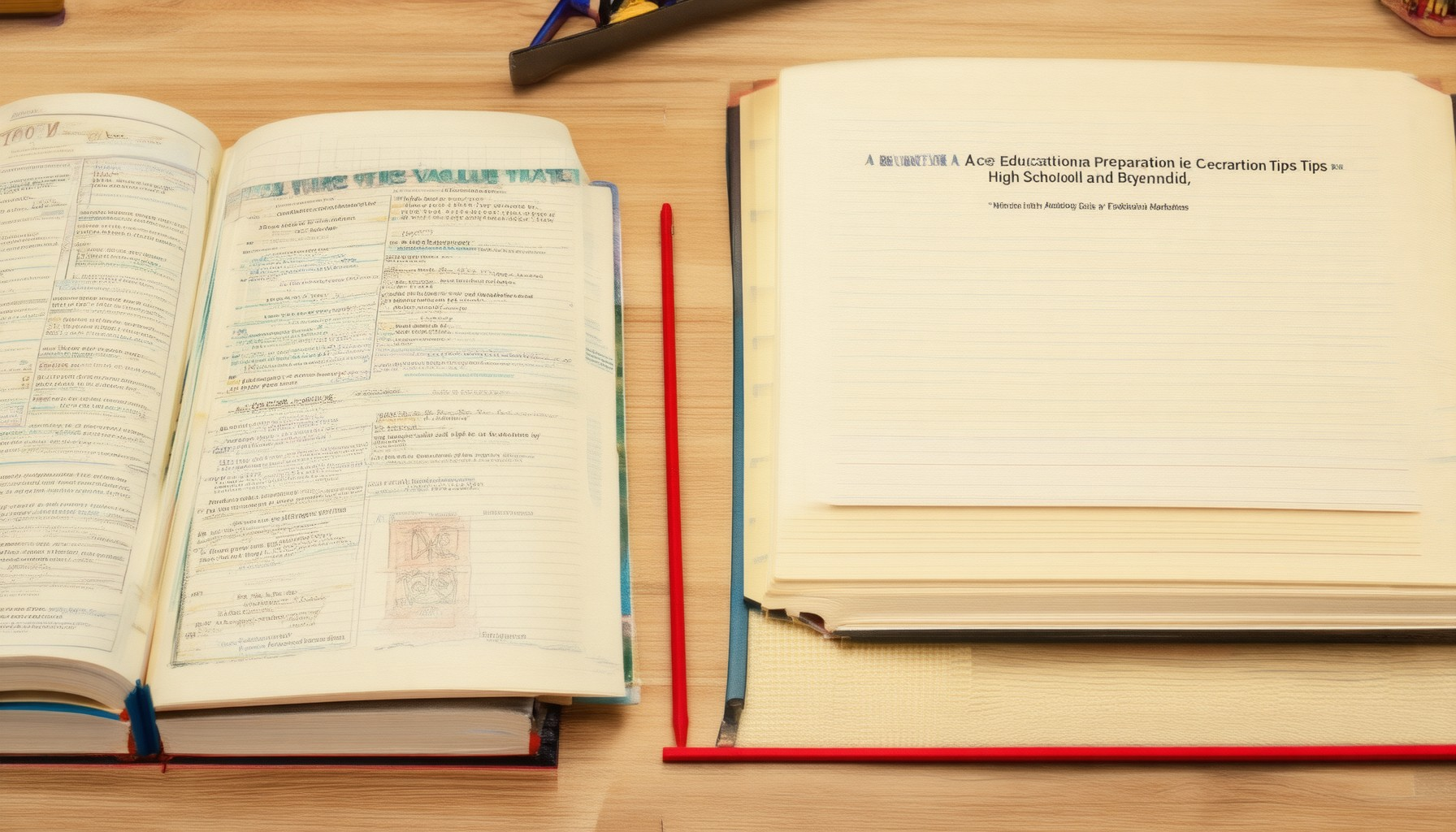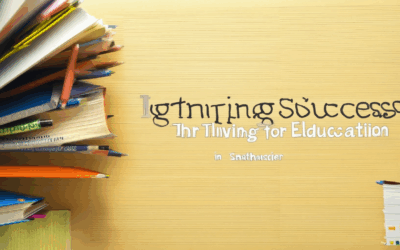Education is the cornerstone of future success, and mastering effective study habits can unlock a world of opportunities. Whether you’re navigating the challenges of high school, preparing for the demands of college, or aiming to excel in a career, having the right educational preparation tips is essential. This comprehensive guide dives into proven strategies, expert advice, and actionable steps designed to help you stay organized, focused, and ahead of the curve. From understanding the 1/2/3 method for studying to exploring the best tips for exam preparation, this article covers everything you need to know to thrive in your academic journey. Discover how to leverage educational programs, utilize top-tier resources, and adopt advanced techniques that will set you apart from the rest. Get ready to elevate your learning process and embrace a mindset geared toward long-term success.
Key Takeaways
- Leverage educational preparation programs to access resources and support for academic success.
- Develop a well-rounded skill set through academic support, extracurricular involvement, personal development, and research opportunities.
- Explore prestigious programs like MIT’s PRIMES, Stanford’s ESP, and Carnegie Mellon’s EGY to gain a competitive edge in your educational journey.
- Enhance college readiness through improved academic performance, boosted confidence, and valuable networking opportunities.
- Prepare for all aspects of life by mastering practical skills, staying organized, and making informed decisions.
The 1/2/3 Method for Studying
The 1/2/3 method is a highly effective strategy for optimizing your study routine. This approach breaks down the learning process into three distinct phases, ensuring that you cover all aspects of a subject matter comprehensively and efficiently.
- 1/2 – Preview and Preparation:
- Review the syllabus and reading materials beforehand to get a broad overview of the topic.
- Take notes while listening to lectures or watching videos, focusing on key concepts and unfamiliar terms.
- Preview quizzes or practice questions to identify knowledge gaps before diving deeper.
- 2/3 – Elaboration and Exploration:
- Expand on the material by discussing it with peers or teachers, asking questions to deepen understanding.
- Create summaries, mind maps, or flashcards to organize and retain information effectively.
- Engage in active learning activities such as solving problems or applying concepts to real-world scenarios.
- 3/3 – Review and Retention:
- Revisit your notes and summaries to reinforce memory of the material.
- Practice retrieval by answering questions or explaining concepts without notes.
- Schedule regular review sessions to ensure long-term retention of the information.
This method ensures that you allocate sufficient time to each phase of learning, balancing initial exposure with deep understanding and long-term retention. By following the 1/2/3 approach, you can maximize the effectiveness of your study sessions and achieve better academic outcomes.
What is the Best Educational Preparation to Become a Nurse?
To pursue a career in nursing, you need to undergo rigorous education and training. Here’s a detailed guide to help you prepare effectively:
1. Choose the Right Education Path
- Associate Degree in Nursing (ADN): A fast-track option for those already working in healthcare, focusing on practical skills and patient care.
- Bachelor of Science in Nursing (BSN): Ideal for those aiming for leadership roles or advanced certifications, offering broader academic exposure.
2. Enroll in an Accredited Program
- Select a program accredited by the Commission on Collegiate Nursing Education (CCNE) or equivalent bodies to ensure quality education.
3. Maintain High Academic Performance
- Strive for top grades to enhance your credentials and stand out in the competitive job market.
4. Gain Clinical Experience
- Secure internships or part-time positions in healthcare settings to apply theoretical knowledge in real-world scenarios.
5. Prepare for Licensure Exams
- Pass the NCLEX-RN or NCLEX-PN exams, required for obtaining a nursing license in most states.
6. Pursue Continuing Education
- Consider advanced degrees or certifications (e.g., CRNP, CNP) to specialize in specific areas like pediatrics or gerontology.
7. Build Strong Communication Skills
- Develop excellent communication abilities to effectively interact with patients, families, and healthcare teams.
8. Stay Updated on Industry Trends
- Keep abreast of the latest developments in healthcare through continuing education courses and professional organizations.
Additional Resources
- Explore platforms like Enroll Maven for valuable tips and resources to aid your nursing education journey.
By following these steps, you’ll be well-prepared to enter the nursing profession with confidence and competence.
Best Tip for Studying
Studying effectively requires a combination of strategy, discipline, and optimal conditions. Here’s a comprehensive guide to help you maximize your learning potential:
- Set Clear Goals:** Understand exactly what you’re studying and why. Knowing your objectives keeps you focused and motivated.
- Time Management:** Schedule your study sessions in advance and stick to them. Consistency is key to long-term success.
- Create the Right Environment:** Choose a quiet, comfortable space free from distractions. A dedicated study zone can significantly boost concentration.
- Active Learning:** Engage with the material through discussions, teaching others, or applying concepts practically.
- Break It Down:** Divide complex topics into smaller, manageable parts to avoid feeling overwhelmed.
- Stay Organized:** Use planners, digital apps, or note-taking systems to track progress and deadlines.
- Sleep and Exercise:** Prioritize sleep and regular exercise to support brain function and overall health.
- Seek Help When Needed:** Don’t hesitate to ask teachers, classmates, or mentors for clarification or additional resources.
By incorporating these tips into your routine, you can create a robust study plan tailored to your unique needs and goals. Remember, consistency and adaptability are the cornerstones of effective learning.
Examples of Educational Preparation Programs
Educational preparation programs offer a variety of resources and support to help students succeed academically. Here are some notable examples:
-
High School Preparation
- The AIME (American Invitational Mathematics Examination) program
- The National Merit Scholarship Program
- The Siemens Competition in Math and Science Research
-
College Preparation
- The Gates Millennium Scholars Program
- The Coca-Cola Scholars Program
- The Jack Kent Cooke Foundation Scholars Program
-
Scholarship Opportunities
- The Ford Foundation Fellowship Program
- The Mellon Foundation Fellowships
- The Howard Hughes Medical Institute Predoctoral Fellowships
-
Test Preparation and Tutoring
- Kaplan Test Prep
- Princeton Review
- ACT/SAT Boot Camps
-
Online Education Platforms
- Enroll Maven
- Course Hero
- Udemy
What is Considered an Educational Preparation Program?
An educational preparation program is designed to enhance academic skills, broaden intellectual horizons, and prepare students for future challenges. These programs often focus on developing critical thinking, leadership, and problem-solving abilities while fostering a deeper understanding of various subjects.
Key Components of Educational Preparation Programs
- Academic Support :
Programs may include tutoring, study groups, or workshops to help students master challenging subjects or prepare for standardized tests like SAT, ACT, or AP exams. - Extracurricular Involvement :
Engaging in clubs, sports, or volunteer work can demonstrate dedication and leadership, which are valuable traits for college admissions committees. - Personal Development :
Programs focused on self-awareness, emotional intelligence, and resilience equip students with tools to navigate academic and life challenges effectively. - Research Opportunities :
Participating in research projects or internships allows students to gain hands-on experience in their field of interest, often under the guidance of faculty members. - Study Abroad Programs :
Some programs offer study abroad opportunities, providing students with cultural exposure and global perspectives that enrich their education.
Examples of Educational Preparation Programs
- MIT’s PRIMES (Program in Mathematics for Elementary, Middle, and High School Students) :
A unique program designed to inspire middle and high school students to explore mathematics and its implications in the world. - Stanford University’s Earth Systems Program (ESP) :
A summer program for high school students that provides intensive training in Earth systems science, preparing them for college-level research. - Carnegie Mellon University’s Early GonguS (EGY) Program :
A pre-college program for high school students interested in fields like computer science, engineering, and mathematics.
Benefits of Participation
Enrolling in an educational preparation program can significantly boost confidence, improve academic performance, and open doors to exclusive networking opportunities. These experiences often lead to stronger college applications and a more competitive edge in the college admission process.
For more resources and tips on preparing for college, visit Enroll Maven to explore tailored strategies and guidance tailored to your educational journey.
What are examples of preparation?
Preparation is the process of making ready for something beforehand. Here are some examples:
- Dressing appropriately for an event or job interview.
- Studying for exams or quizzes to ensure readiness.
- Practicing a speech or performance to meet expectations.
- Preparing a meal or recipe ahead of time.
- Setting up equipment or materials needed for a task or project.
- Learning a new skill or technique through practice and study.
- Planning and organizing a trip or event to ensure everything is in order.
- Exercising regularly to stay physically prepared for activities.
- Researching and gathering information before making an important decision.
At Enroll Maven, we understand the importance of preparation in achieving your goals. Whether it’s academic, professional, or personal, our resources are designed to help you prepare effectively. Visit us today to explore tools and tips tailored to your needs!









0 Comments